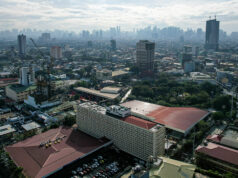More subway phase 1 packages offered
THE DEPARTMENT of Transportation (DoTr) is inviting Japanese firms and Japanese-led joint ventures to bid to provide train sets, as well as electrical and mechanical (E&M) systems and rail track works as part of the first phase of the Metro Manila Subway Project, one of the current administration’s flagship developments funded by Japan official development assistance (ODA).
“Pursuant to the rules for official development assistance funding, the Department of Transportation as the employer, through its procuring agent, Procurement Service, now invites eligible bidders of Japanese nationality to participate in the international competitive bidding process, following the procedures specified in the guidelines for procurement under Japanese ODA Loans published in April 2012, for the procurement of E&M (electrical & mechanical) Systems and Track Works for the Metro Manila Subway Project Phase 1,” the DoTr said in a bulletin published in newspapers on Tuesday.
In a separate bulletin on Tuesday, the department also sought bids from Japanese firms “for the design, execution and completion of 30 train sets consisting of eight electric multiple units” or a total of 240 train cars.
Both the purchase of E&M systems and train sets will go through international competitive bidding in accordance with bidding procedures of the Japan International Cooperation Agency which funds the project.
The DoTr said bidding documents may be bought for P50,000, which is non-refundable.
There is no prequalification stage.
TRAINS
For the train sets, the DoTr will hold a pre-bid conference at 10 a.m. on Jan. 17 next year at the office in Manila of the Procurement Service of the Department of Budget and Management (DBM-PS), while bids should be submitted by 10 a.m. on March 17, 2020 with a ¥600-million bid security at the same office.
Interested companies must, among others:
• have a minimum average annual turnover of $210 million, calculated as total certified payments received for contracts within the last five years, divided by five years;
• demonstrate access or availability of liquid assets, unencumbered real assets, lines of credit and other financial means sufficient to meet the contract’s $26-million cash-flow requirement, net of other commitments;
• and demonstrate experience in completing rolling stock contracts as a prime contractor, subcontractor or management contractor since Jan. 1, 1999.
E&M
For E&M systems and track works, the DoTr has set pre-bid conference on Jan. 24 and deadline for submission of bids — with an ¥800-million bid security — on March 24, also at the DBM-PS office.
Interested parties must show, among others:
• minimum average annual turnover of $320,000;
• access to or availability of liquid assets, unencumbered real assets, lines of credit and other financial means to meet a $40-million cash-flow requirement, net of other commitments;
• and experience for at least 10 years — or since Jan. 1, 2009 — in similar contracts in the role of primary contractor, subcontractor or management contractor.
According to the DoTr website, the first phase of the project covers three packages, namely: rolling stock; electromechanical system and track works; as well as the first three underground stations (Quirino Highway, Tandang Sora, North Avenue), tunnels and depot construction, depot equipment and buildings.
The government broke ground for the first three stations of the subway project last February after the DoTr signed a P51-billion deal for that package with the Shimizu Joint Venture, which consists of Shimizu Corp., Fujita Corp., Takenaka Civil Engineering Company Ltd. and EEI Corp.
While the public will have to wait till 2025 for full operations of the 36-kilometer subway, the government targets partial operations — covering the first three stations — by 2022. The government estimates 100,000 commuters to use the partially opened system each day, increasing to 370,000 passengers daily once fully operational.
The completed system will have 14-15 stations between Mindanao Avenue in Quezon City and the Ninoy Aquino International Airport in Pasay City that will enable a 40-minute ride from end to end. It will also link up with Metro Manila’s other railways at the common station being built along North Avenue in Quezon City.
The Philippines and Japan signed in March last year the first tranche of the P355.6-billion loan for the Metro Manila Subway Project, which was approved by the National Economic and Development Authority Board, chaired by President Rodrigo R. Duterte, in a Sept. 12, 2017 meeting. — Arjay L. Balinbin



